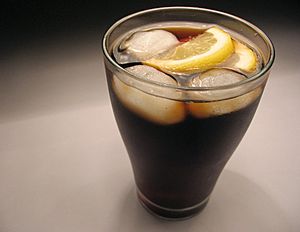Cola facts for kids
Cola is a popular soft drink. It is sweet and has bubbles (it's carbonated). Cola drinks were first made from caffeine from the kola nut and parts of coca leaves. They were also flavored with vanilla and other things. Today, most colas use different ingredients for flavor and caffeine that taste similar.
Cola drinks became famous around the world after a pharmacist named John Pemberton created Coca-Cola in 1886. His original recipe did not contain alcohol. It was inspired by a drink called coca wine, made by another pharmacist, Angelo Mariani, in 1863.
Today's colas usually have caramel color (to make them brown), caffeine, and sweeteners. These sweeteners can be sugar or high-fructose corn syrup.
Contents
What Gives Cola Its Flavor?
Even though it's called "cola," the main flavors in most cola drinks today come from other things. These include sugar, citrus oils (from oranges, limes, or lemons), cinnamon, vanilla, and something to make it a little sour.
Cola makers add tiny amounts of other ingredients. This helps each brand have its own special taste. Some of these extra flavors might be nutmeg. But the main flavors that most people recognize in cola are vanilla and cinnamon. The sour taste often comes from phosphoric acid. Sometimes, citric acid or other acids are also used. The exact recipe for Coca-Cola is a secret that the company keeps very carefully.
Sweeteners Used in Cola
Different kinds of sweeteners are used in cola drinks. This often depends on what crops are grown in a country. For example, in the United States and Canada, high-fructose corn syrup (HFCS) is often used. This is because corn is cheaper there.
In Europe, however, sugar is usually used to sweeten sodas. This is because there are rules about how much HFCS can be made. Sometimes, sweeteners like stevia or artificial sweeteners are used. "Sugar-free" or "diet" colas usually only have artificial sweeteners.
How Cola Affects Your Health
Some studies have looked at how drinking cola can affect your health. A study in 2007 suggested that drinking colas, both regular and diet, might be linked to a higher risk of chronic kidney disease. The phosphoric acid found in colas was thought to be a possible reason for this.
Experts say that sodas and other sweetened drinks are a big source of calories for many people. Because of this, most nutritionists suggest that drinking too much Coca-Cola or other soft drinks can be unhealthy. This is especially true for young people. When kids drink a lot of soft drinks, they might not drink or eat enough healthy foods.
Studies have also shown that people who drink soft drinks regularly might get less of some important nutrients. These include calcium, magnesium, ascorbic acid (Vitamin C), riboflavin, and vitamin A.
Cola drinks also contain caffeine. Caffeine can make your body depend on it, which is sometimes called caffeine addiction.
Many soft drinks are sweetened mostly or entirely with high-fructose corn syrup instead of sugar. Some nutritionists warn that consuming a lot of corn syrup might make obesity and type-2 diabetes worse than cane sugar.
Images for kids
See also
 In Spanish: Bebida de cola para niños
In Spanish: Bebida de cola para niños
 | Charles R. Drew |
 | Benjamin Banneker |
 | Jane C. Wright |
 | Roger Arliner Young |




